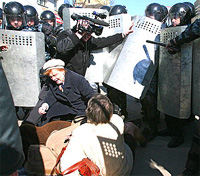On March 27th, well-known human rights activists sent an open statement to RF Human Rights Ombudsman Vladimir Lukin and Chairperson of the President Council for Development of Civil Society Ella Pamfilova. Human rights activists appeal for urgent uniting of forces against violations of civil rights. (29-MAR-07)
Text: HRH/Moscow, by Yanina Savenko, based on the statement of human rights activists to the RF Ombudsman for Human Rights
They demand immediate response to “appalling violations of human rights and basic freedoms, first of all, infringement on the right to a peaceful demonstration, on the right to personal immunity and of the right of association”. They also demand to organize a joint extraordinary meeting of the official human rights watchdogs. This appeal was signed by dozens of well- known activists, including members of the Russian Research Center for Human Rights.
Violent dispersion of the peaceful protests  March of the current year saw an extremely violent dispersion of several peaceful demonstrations in the RF regions. On the 3rd, Saint-Petersburg police interrupted 7000-strong “March of the Discontent,” beating and arresting hundreds. However, on the 24th the level of brutality spilled over in Nijni-Novgorod, where 300 peaceful demonstrators, journalists and passers-by encountered 20.000 members of the Russia’s special forces. In both instances the extra battalions were brought over from neighboring regions, which required federal approval. Law enforcement officials prevented medical assistance to the many injured, including the elderly. They also detained members of the legislative bodies, who by law are immune to such treatment. Curiously, the Nijni-Novgorod fiasco happened three short days after the president’s assurance that peaceful protests could not be stopped.
March of the current year saw an extremely violent dispersion of several peaceful demonstrations in the RF regions. On the 3rd, Saint-Petersburg police interrupted 7000-strong “March of the Discontent,” beating and arresting hundreds. However, on the 24th the level of brutality spilled over in Nijni-Novgorod, where 300 peaceful demonstrators, journalists and passers-by encountered 20.000 members of the Russia’s special forces. In both instances the extra battalions were brought over from neighboring regions, which required federal approval. Law enforcement officials prevented medical assistance to the many injured, including the elderly. They also detained members of the legislative bodies, who by law are immune to such treatment. Curiously, the Nijni-Novgorod fiasco happened three short days after the president’s assurance that peaceful protests could not be stopped.
Unlawful ban on opposition’s protests and attempts to discredit the organizers
According to the official line, Marches of the Discontent in both cities were banned due to traffic concerns. Strictly speaking, the government proposed a substitute to the demonstration in the form of a small gathering in the remote location. This has become a usual practice in recent years. However, rallies of many thousands in support of the President were allowed in the cores of the cities around the same days. Moreover, prior to the aforementioned events, government media conducted a successful campaign against the organizers’ characters, reporting their allegiance to the foreign interests and extremist groups and ideas.
 Shutting down of the unwanted political parties
Shutting down of the unwanted political parties
Another example of total suppression of fundamental democratic freedoms is a temporary ban by the Public Prosecutor’s Office (without ruling of the court) on activities of the “National-Bolshevik Party”. Moreover, recently court has brought down a verdict to shut down one of the ancient democratic parties of the contemporary the Russian Federation – Republican Party of the Russian Federation. At the same time such ultra-nationalist and Fascist organizations as the Movement Against Illegal Immigration, “Slavic Union” and others are not interfered with. According to human rights activists, shutting down of the Republican Party is legalizing blatant political persecution.
Human rights violations are becoming more numerous and frequent
The statement reports only about recent events, which got international attention. But similar bans and dispersals of peaceful demonstrations have been taking place in many Russian cities in recent years. Human rights activists have already sent an appeal to the European Council concerning human rights violations. However, representatives of Russian authorities claimed that the protesters themselves were responsible for the brutal dispersal of the demonstrations and that they had allegedly provoked such a harsh response.





